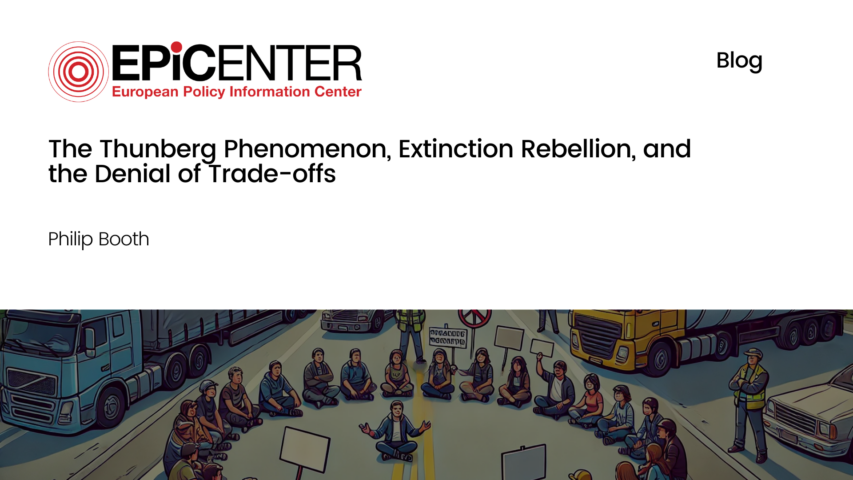The Thunberg Phenomenon, Extinction Rebellion, and the Denial of Trade-offs

The Thunberg Phenomenon, Extinction Rebellion, and the Denial of Trade-offs
Professor Philip Booth // 8 October 2019
When it comes to environmental problems in general and global warming in particular, I empathise with those who take the issue seriously. I like nature and I am risk averse. However, I tend to disagree with most campaigners on their policy conclusions which are frequently dangerous, at best.
Greta Thunberg has become a sensation. But what is worrying about this phenomenon is that the more detached from critical reason her arguments become the more she is acclaimed.
She began by arguing that those who put forward alternative views were liars and that she had a special gift for being able to tell when people were lying. Her recent speech at the UN Climate Summit was simply a series of assertions.
In many senses, economic problems are more complex than scientific problems and Thunberg is, implicitly at least, pronouncing on economic matters. Whilst knowledge about climate science is uncertain, a judgement has to be and can be made on the balance of evidence. But economic decisions involve trade-offs. Economics is, as Lionel Robbins put it, the science of not being able to have your cake and eat it. We cannot both decrease carbon emissions hugely and enjoy standards of living increasing at the rate that would have been possible if emissions were not reduced.
It is tempting the believe the green rhetoric that we will all have fluffy green jobs and a green standard of living without any hardship from reducing emissions. We cannot. Reducing carbon emissions quickly to zero means that we will have much less of everything else. We might prefer decarbonisation to other goods and services, but it is not a cost-free choice. We considering this, we should remember that the average income in the UK is ten times the average income in the rest of the world. When other people face these trade-offs the sacrifice of decarbonisation is that much greater.
One of the advantages of being richer is that we are more resilient to natural disasters. It follows from this that there is a trade-off between decarbonisation, which might lead to fewer natural disasters, and our ability to cope with them, which might reduce if we become less rich. As we have become richer, deaths from natural disasters have plummeted. The figure shows the fall in deaths in natural disasters over the last century – they have reduced by, perhaps, 90 per cent.

The use of air conditioning illustrates this trade-off in a rather stark way. In a letter on the environment written by Pope Francis in 2015 called Laudato si, the pontiff strongly criticised the adoption of air conditioning in the strongest terms. An academic paper on air conditioning in the US produced such remarkable results that the abstract is worth quoting at length:
“the mortality effect of an extremely hot day declined by about 80% between 1900-1959 and 1960-2004. As a consequence, days with temperatures exceeding 90°F were responsible for about 600 premature fatalities annually in the 1960-2004 period, compared to the approximately 3,600 premature fatalities that would have occurred if the temperature-mortality relationship from before 1960 still prevailed. Second, the adoption of residential air conditioning (AC) explains essentially the entire decline in the temperature-mortality relationship. In contrast, increased access to electricity and health care seem not to affect mortality on extremely hot days.”
Air conditioning leads to higher carbon emissions and, most likely, higher global temperatures. But the increase in resilience arising from air conditioning is astonishing – it has led to an 80 per cent drop in deaths from heat.
In the rich West, it might be thought that we can cope. We can have air conditioning powered by wind farms, for example. This would be expensive, but it would be possible. Giving up whatever we need to give up to have both air conditioning and decarbonisation in southern US states or in Australia might be extremely uncomfortable for the less well off in society, but people would not starve or go without the basics necessary for life. But, for developing countries, the sacrifices in terms of growth that arise from decarbonisation might give rise to much starker choices. Only 8 per cent of people living in the tropics benefit from air conditioning. Its expansion may raise average temperatures slightly as a result of higher carbon emissions, but it will also make people far more resilient to those higher temperatures, especially from its adoption in hospitals.
Of course, improved technology may lead to air conditioning producing much less CO2 as a result of improved energy efficiency. This is why economists propose carbon taxes or carbon trading as the best way to reduce carbon emissions. People can then choose the most efficient way to reduce emissions whilst keeping those carbon-emitting technologies that are most valuable to them or which are most difficult to replace.
Extinction Rebellion seems to be strongly linked to far-left political movements. The left often argue that climate change cannot be solved by markets. And the trade-offs discussed in this article cannot easily be solved by markets either because the costs of carbon emissions are not born by the emitters (unless through the mechanism of taxing carbon emissions or by carbon trading). However, central planning of the economy has no rational mechanism for taking economic decisions at all. Not only that, but that centrally planned economies have been catastrophic for environmental outcomes, just as they have been for all other aspects of economic welfare.
EPICENTER publications and contributions from our member think tanks are designed to promote the discussion of economic issues and the role of markets in solving economic and social problems. As with all EPICENTER publications, the views expressed here are those of the author and not EPICENTER or its member think tanks (which have no corporate view).



